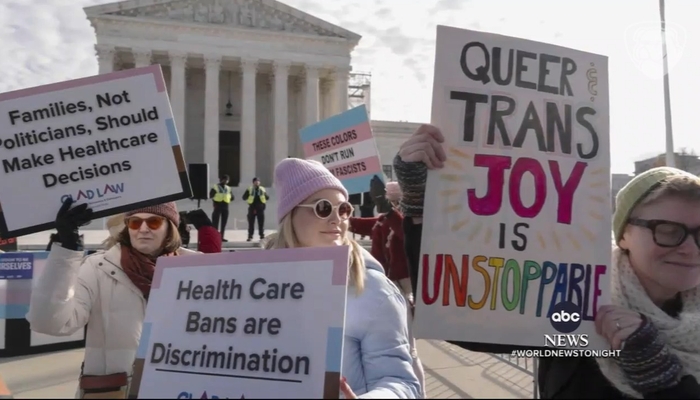We support our Publishers and Content Creators. You can view this story on their website by CLICKING HERE.

Reasonable individuals may presume that the pro-abortion Regime Media may also be in support of hormonal and surgical mutilations of children, euphemistically known as “gender affirming care”. Network evening news coverage of yesterday’s Supreme Court hearing on this issue removes all doubt for anyone harboring these reasonable presumptions.
Of the network newscasts, ABC’s is the most nakedly pro-transing of the kids. Here it is, in its entirety:
ABC WORLD NEWS TONIGHT
12/4/24
6:45 PM
DAVID MUIR: From the Supreme Court tonight, oral arguments in a landmark case that could determine access to health care for transgender youth across this country. In question, a Tennessee law banning gender affirming care such as hormone therapy and puberty blockers for minors. Several Tennessee families with transgender children say the law is unconstitutional. The conservative majority on the court seemed to side with Tennessee’s move. 26 states have passed laws restricting gender affirming care. The Supreme Court’s decision expected this spring.
David Muir’s brief doesn’t bother with such quaint concepts as balance. There is no mention of the arguments against these treatments except that Tennessee makes them and the Court appears to agree with them.
The euphemistic language of the trans lobby is presented here as normal and mainstream. In framing the issue as one of “access to care”, one hears echoes of the pro-abortion arguments also championed by the Regime Media. The fundamental difference being, perhaps, that the abortions now being advocated for (whether surgical or “medicinal”) are no longer (immediately) lethal, and are administered sometime after the 40th trimester. Other than that, the coverage sounds identical.
The most balanced coverage comes via CBS, which did a full story on the SCOTUS hearing. To be clear, the story is still very strongly biased in favor of the transing of children. However, correspondent Jan Crawford did air a viewpoint usually silenced on Regime Media: that of the detrans movement right before closing out her report:
ERIN FRIDAY: And anybody can go back into their youth and think about decisions that they made at 13, 14, or things that they thought “I’ll never have kids, I’ll never get married,” (VIDEO SWIPE) but it changes. It changes over life, and once you medicalize a child, they don’t get to change their mind.
CRAWFORD: Now you know, as you can see, both these families want the same thing. They want their kids to be happy, they want to protect them, and they both believe that the other side’s approach would cause terrible harm. And as significant as this case is, the question of transition treatments, the decision could go well beyond this issue. For example, questions today: if the Court strikes down these state laws as unconstitutional, how could that bolster transgender arguments for participation in girls and women’s sports? Norah.
O’DONNELL: Jan Crawford. Thank you very much.
The detrans argument is bracketed by Crawford’s bothsidesing of the issue, AND by the hope that a striking down of the Tennessee law might legitimize boys who want to play in girls’ sports.
NBC didn’t bother with nuance, either. Interestingly, Hallie Jackson frames the Biden administration’s challenge of the Tennessee law as patriotic- a pushback against European bans on “gender affirming care”:
HALLIE JACKSON: At issue, a Tennessee law that bans puberty blockers and hormone therapy for trans youth. But it allows those treatments for other reasons. That’s why opponents argue the law discriminates on the basis of sex. Liberal Justice Elena Kagan:
ELENA KAGAN: One of the articulated purposes of this law is essentially to engend- encourage gender conformity, and to discourage anything other than gender conformity. (VIDEO SWIPE) Sounds to me like we want boys to be boys and we want girls to be girls.
JACKSON: But others, pointing to places in Europe putting restrictions on gender affirming care.
BRETT KAVANAUGH: The countries that have been at the forefront of this are, you know, pumping the brakes on this kind of treatment because of concerns about the risks.
JACKSON: The Biden administration pushing back, pointing to how the treatments have saved lives.
Compare that to policy comparisons covered to favor European policy, such as on speech or guns. Whereas they are usually cheered for their censorship and gun control stances, here the Euros are now the baddies for not allowing genitalia to be chopped off of children.
Coverage of the Supreme Court hearing on the Tennessee ban on child sexual mutilation was equal parts disturbing and enlightening and serves as a preview for what coverage might look like of the Court upholds the Tennessee law. Expect Dobbs lite.
The Regime Media want to trans your kids.
Click “expand” to view full transcripts of the aforementioned CBS and NBC reports as aired on Wednesday, December 4th, 2024:
CBS EVENING NEWS
12/4/24
6:44 PM
NORAH O’DONNELL: In one of the most anticipated cases at the Supreme Court this session, the justices heard arguments today over Tennessee’s ban on gender affirming care for minors. Similar bans have been enacted in nearly half the country. CBS’s Jan Crawford has more on a case that could have sweeping consequences.
JAN CRAWFORD: Competing rallies made clear the conflict. But in arguments, a majority of justices appear to agree, laws passed by Tennessee and 23 other states banning hormone treatments and puberty blockers for children who identify as transgender do not violate the Equal Protection Clause.
BRETT KAVANAUGH: If the Constitution doesn’t take sides, if there’s strong, forceful, scientific policy arguments on both sides in a situation like this, why isn’t it best to leave it to the democratic process?
CRAWFORD: Conservative justices pointed to growing international concerns that transition medications are unsafe for children.
JOHN ROBERTS: I think that would be very troubling, to say that in such a evolving situation, we are going to decide what the right approaches are.
CRAWFORD: Liberal justices pushed back. One compared the bans to racist Jim Crow-era laws.
KETANJI BROWN JACKSON: I’m worried that we’re undermining the foundations of some of our bedrock equal protection cases.
CRAWFORD: And said the medication could be life-saving.
SONIA SOTOMAYOR: The evidence is very clear that there are some children who actually need this treatment.
CRAWFORD: L.W. is one of the children at the center of the case. She started medication to stop male puberty at 13, and female estrogen a year later.
SAMANTHA WILLIAMS: I can’t imagine her without her medicines. She’s a different kid. She’s a healthier, happier kid… (VIDEO SWIPE) …all we’re trying to do is make the best decisions for our kid.
CRAWFORD: But a California mom who refused to allow the medication when her teenage daughter identified as trans, and has since detransitioned, said the risks are too high.
ERIN FRIDAY: And anybody can go back into their youth and think about decisions that they made at 13, 14, or things that they thought “I’ll never have kids, I’ll never get married,” (VIDEO SWIPE) but it changes. It changes over life, and once you medicalize a child, they don’t get to change their mind.
CRAWFORD: Now you know, as you can see, both these families want the same thing. They want their kids to be happy, they want to protect them, and they both believe that the other side’s approach would cause terrible harm. And as significant as this case is, the question of transition treatments, the decision could go well beyond this issue. For example, questions today: if the Court strikes down these state laws as unconstitutional, how could that bolster transgender arguments for participation in girls and women’s sports? Norah.
O’DONNELL: Jan Crawford. Thank you very much.
NBC NIGHTLY NEWS
12/4/24
6:43 PM
LESTER HOLT: Now to the potential landmark case before the Supreme Court concerning transgender rights, and one state’s law banning transition-related care for minors. Hallie Jackson now on today’s arguments and how the justices signalled they may rule.
HALLIE JACKSON: The so-called culture wars colliding with the Supreme Court tonight…
PROTESTER: I’m not against trans rights. I’m against it on minors.
JACKSON: …as the justices consider whether states can restrict gender affirming care for kids and teens. And the signal so far, support for letting those bans continue. Some conservative justices concerned the Court would be second-guessing states if it stepped in.
JOHN ROBERTS: The Constitution leaves that question to the people’s representatives, rather than to nine people, none of whom is a doctor.
JACKSON: At issue, a Tennessee law that bans puberty blockers and hormone therapy for trans youth. But it allows those treatments for other reasons. That’s why opponents argue the law discriminates on the basis of sex. Liberal Justice Elena Kagan:
ELENA KAGAN: One of the articulated purposes of this law is essentially to engend- encourage gender conformity, and to discourage anything other than gender conformity. (VIDEO SWIPE) Sounds to me like we want boys to be boys and we want girls to be girls.
JACKSON: But others, pointing to places in Europe putting restrictions on gender affirming care.
BRETT KAVANAUGH: The countries that have been at the forefront of this are, you know, pumping the brakes on this kind of treatment because of concerns about the risks.
JACKSON: The Biden administration pushing back, pointing to how the treatments have saved lives. Atlas McGuinness and his mom Courtney traveling from Delaware just to be at court today.
COURTNEY MCGUINNESS: As a parent, you just automatically go through “how am I going to make sure that my child gets the care that they need?”
JACKSON: What would you want the justices to know about you, if you could give them a message?
ATLAS MCGUINNESS: I’m human. I’m just the same as any other kid other than the fact that I identify differently.
JACKSON: Any impact would stretch far beyond Tennessee. More than 20 other states have similar laws in place. Part of an intense debate nationally over trans rights. Any decision probably won’t come until closer to the end of the Court’s term in June. Lester?
HOLT: Hallie Jackson, thanks.

 Conservative
Conservative  Search
Search Trending
Trending Current News
Current News 





